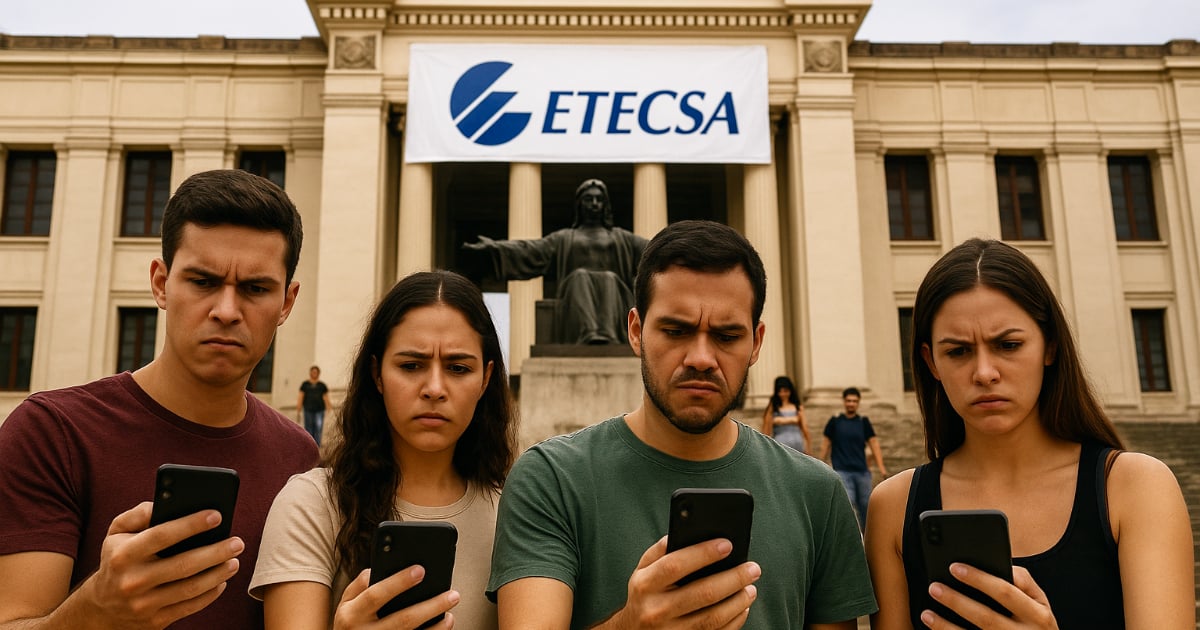In an unexpected move, the University Student Federation (FEU) from several faculties at the University of Havana and the Higher Institute of International Relations (ISRI) released a joint statement on Saturday, openly condemning the recent pricing changes announced by Cuba's Telecommunications Company (ETECSA). This criticism is notably bold for an organization that has traditionally aligned with the government since the triumph of the so-called "revolution."
The students have strongly criticized the newest pricing strategy, labeling it a “rate hike” that inherently restricts essential rights such as access to information, education, and communication—critical pillars for their academic development. According to their statement shared on social media, these new policies—which limit national currency top-ups to merely 360 CUP every 30 days and impose exorbitant costs for additional packages—pose a direct barrier to fulfilling their educational and professional duties.
“The increased cost of data top-ups beyond 6GB stands as a significant barrier, impeding our ability to meet our educational and professional obligations,” stated the FEU from the Faculty of Communication (FCOM) of the University of Havana. This statement was additionally endorsed by student representatives from the faculties of Chemistry, Philosophy and History, Mathematics and Computer Science, InSTEC, and ISRI.
The dissatisfaction stems from a new pricing model that has effectively dollarized essential mobile data services. With an average salary hovering around 4,000 CUP, students and professionals now face the burden of paying over 3,000 CUP for merely an additional 3 GB of data—or opting for dollar-based plans that are unaffordable for those not receiving remittances.
The outrage sparked by these measures has only intensified. What began as a flood of critical comments on social media and official platforms has evolved into a wave of reactions from various social sectors. The statement from the FEU holds particular symbolic weight as it originates from the nation's youth institutional framework.
The students expressed their willingness to engage in dialogue with the relevant authorities but demanded an urgent reassessment of the measures and the exploration of alternatives that consider the economic realities of the most vulnerable sectors, such as students. “We reaffirm our commitment to defending free and equitable access to Information and Communication Technologies (ICT),” the statement added. “These measures are detrimental to the comprehensive development of the youth and society at large.”
Concluding their message, the students reiterated their determination to advocate for internet access in Cuba to be recognized and guaranteed as a universal right, not a privilege reserved for those who can afford it in foreign currencies or through the informal market. This statement was issued just hours after a televised Round Table where ETECSA executives defended the measures as necessary to sustain the country's technological infrastructure. Nevertheless, the official response has failed to quell the discontent.
The FEU's pronouncement presents a political challenge that highlights the disconnect between the official narrative and the everyday experiences of a highly connected youth, reliant on internet access for studying, researching, staying informed, and maintaining family ties. All of this unfolds in a country facing one of its most severe crises in energy, food, and migration.
The government's silence in response to this public student dissent may mark a turning point in the type of responses ETECSA—and the Cuban State itself—will need to provide if they aim to maintain more than just technical coverage over Cuba's youth.
Impacts of ETECSA's Pricing Changes on Cuban Students
Why are Cuban students opposing the new ETECSA tariffs?
Cuban students oppose the new tariffs because they believe these measures limit their fundamental rights to information, education, and communication, which are essential for their academic growth.
What are the main concerns about ETECSA's new pricing model?
The primary concerns are the high costs of data top-ups and the dollarization of mobile data services, making them unaffordable for many students and professionals who do not receive remittances.
How has the public reacted to ETECSA's new pricing?
The public reaction has been overwhelmingly negative, with a growing wave of criticism on social media and a call for urgent reassessment of these measures by various social sectors.
